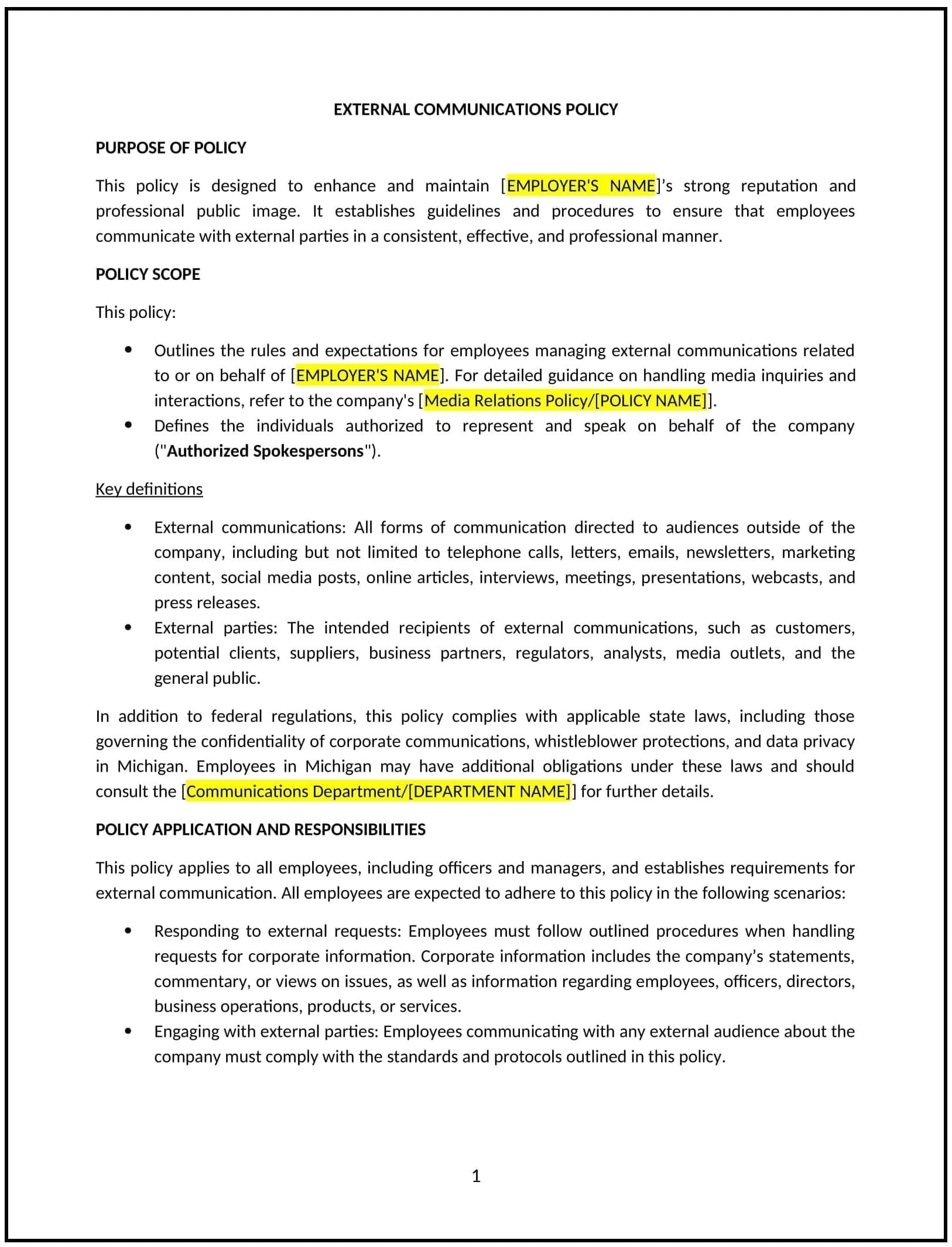External communications policy (Michigan): Free template
Got contracts to review? While you're here for policies, let Cobrief make contract review effortless—start your free review now.

Customize this template for free
External communications policy (Michigan)
An external communications policy provides Michigan businesses with guidelines for communicating with external stakeholders, including customers, the media, and the general public. This policy ensures that all external communications are consistent, accurate, and aligned with the company’s values, brand, and legal obligations.
By adopting this policy, businesses can maintain a positive public image, avoid miscommunication, and ensure that all external communications adhere to applicable laws and industry standards.
How to use this external communications policy (Michigan)
- Define the scope of external communications: Clearly outline the types of external communications covered by the policy, such as press releases, marketing materials, social media posts, public statements, and interactions with the media.
- Identify authorized spokespersons: Designate specific employees or representatives who are authorized to speak on behalf of the business to the media or the public, ensuring that communication is consistent and controlled.
- Establish communication channels: Specify the official channels through which external communications should be made, such as company websites, social media platforms, or direct media contact, and establish procedures for using these channels.
- Ensure accuracy and consistency: Require that all external communications are reviewed for accuracy, clarity, and consistency with the business’s brand messaging, values, and legal requirements.
- Address sensitive topics: Provide guidelines for handling sensitive issues, such as crises, legal matters, or controversial topics, ensuring that responses are measured and aligned with the company’s values.
- Set guidelines for social media usage: Outline how employees should use social media in a professional capacity, ensuring that personal opinions or comments do not reflect poorly on the business.
- Maintain confidentiality: Specify how to handle confidential or proprietary information when communicating externally, ensuring that no sensitive data is disclosed without proper authorization.
- Monitor and respond to external feedback: Establish procedures for monitoring and responding to external feedback, including customer complaints, public criticism, or media inquiries, to maintain the business’s reputation and credibility.
Benefits of using this external communications policy (Michigan)
This policy provides several key benefits for Michigan businesses:
- Protects the company’s reputation: By ensuring that all external communications are consistent and accurate, businesses can protect their brand image and build trust with customers and the public.
- Reduces legal risks: The policy helps businesses avoid miscommunications or unauthorized disclosures that could lead to legal issues, such as defamation, breach of confidentiality, or regulatory violations.
- Promotes clear messaging: A clear and consistent communications strategy helps businesses convey their message effectively, ensuring that external stakeholders understand the company’s position, values, and goals.
- Fosters professionalism: The policy ensures that employees representing the business externally communicate in a professional manner, aligning their conduct with the company’s values and public image.
- Enhances customer relationships: By responding promptly and professionally to external feedback and inquiries, businesses can build stronger relationships with customers and other stakeholders, leading to higher satisfaction and loyalty.
Tips for using this external communications policy (Michigan)
- Communicate the policy: Ensure that employees understand the policy and know who is authorized to speak on behalf of the business by including the policy in the employee handbook, during onboarding, and through regular training sessions.
- Train employees on media interaction: Provide training for employees who may interact with the media or customers to ensure they understand how to respond appropriately and professionally in these situations.
- Review communications regularly: Regularly review all external communications, including press releases, marketing materials, and social media posts, to ensure they align with the policy and the company’s messaging strategy.
- Address potential crises proactively: Develop procedures for managing external communications during a crisis or other sensitive situations, ensuring that employees are prepared to respond effectively and maintain the company’s reputation.
- Monitor external feedback: Set up systems to monitor external feedback from customers, the media, or the public, allowing the business to respond quickly to concerns or negative feedback.